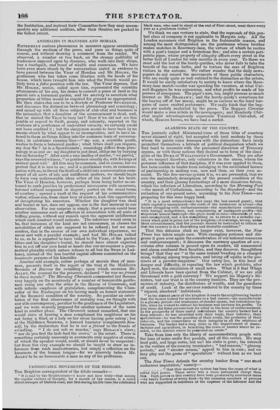ANOMALIES IN MANNERS AND MORALS.
EXTREMELY curious phenomena in manners appear occasionally through the medium of the press, and pass as things quite of
course, and without drawing a comment from the reader. We observed, a number or two back, on the strange gullibility of tradesmen imposed upon by sharpers, who walk into their shops, buy a toothpick, and boast of wealth and connexion. We have
been even more struck by the conversation stated in evidence to have passed between the Vicar of Hendon and Mr. HOLME, the
gentleman who has taken some liberties with the heads of his
house, which have brought him into what the French would po- litely term a false position with the law. The Vicar deposes, that Mr. HOLME, senior, called upon him, represented the scientific attainments of his son, his desire to convert a piece of land in the parish into a botanical garden, and his anxiety to ascertain what proportion of tithes would be required for ground so appropriated. He then states 'his son to be a disciple of Professor SPURZHEIM, and discusses the distinction between phrenology and craniology ; and mixed up with all these subjects of chit-chat and business is the intimation that a daughter of the communicant is dead, and, that he wished the Vicar to bury her ! Now if we did not see this jumble of regard to thrift, gossip, and calamity, reported in the evidence of a gentleman of undoubted veracity, we certainly could not have credited it ; but the clergyman seems to have been by no means struck by what appear to us incongruities, and to have lis- tened to them as things falling into the common train of conversa- tion; in substance running thus—" my son, a scientific youth, wishes to form a botanical garden ; what tithes shall you require, my dear Sir ? he is a Spurzheimite ; craniology differs from phre- nology in so and so : my daughter is just dead, oblige me by burying her on Saturday !" After such a nice medley of matter," we parted," says the reverend witness, "as gentlemen usually do, with feelings of mutual good-will." All this may be common, and in course, but we protest that it is new to us ; and if a gentleman were, in communi- cation with us, to thrust the death of a child into a conversation com- posed of all sorts of idle and indifferent matters, we should begin to form very unfavourable ideas either of his head or his heart. The Vicar of Hendon, however, perhaps from being better accus- tomed to such jumbles by professional intercourse with mourners, listened without suspicion or disgust; parted on the usual terms of courtesy ; opened a vault at the request of his communicative visitor, whose son, from sheer love of science, took this opportunity of decapitating his ancestors. Whether the daughter was dead and buried or not, does not appear, nor is the fact material to our observation. For our surprise is simply, that a person could hear another announce such an affliction in association with all sorts of trifling gossip, without any remark upon the apparent indifference which such conduct would indicate. The inference would seem to be, that instances of the kind are not uncommon, in classes the sensibilities of which are supposed to he refined ; but we must confess, that in the course of our own individual experience, we never met with a parallel example ; and had Mr. HOLME talked to us, as he is reported to have talked to the Vicar, of the garden tithes and his daughter's burial, he should have almost expected him to cut off our own head or heads (for our we requires a gram- matical plurality which nature refuses to all but the Swan in Lad- lane), instead of the less hurtful capital offence committed on the inanimate persons of his kinsfolks. Another odd example, rather perhaps of morals than of man- ners, presents itself in the report of the trial at the Middlesex Sessions of Barrow for swindling; upon which occasion Mr. ALLEY, the counsel for the prisoner, declared "he was no friend to these frauds !" The Morning Chronicle commented last Session very happily on the montrosity of a number of honourable gentle- men rising one after the other in the. House of Commons, and with infinite emphasis of gratulation, complimenting the Chan- cellor of the Exchequer on his having made an honest statement of the financial condition of the country. So peculiar an osten- tation of the first observances of morality was, we thought with our able contemporary, peculiar to the gentlemen of the Legislature, and we were scarcely prepared for another instance of the same kind in another place. The Chronicle indeed remarked, that one would stare at hearing a man compliment his neighbour on his not being a thief, or a lady on her never having gone astray; but at the Middlesex Sessions, a learned barrister compliments him- self; by the declaration that he is not a friend to the frauds of swindling. " I do not rob or murder," says HORACE'S slave; nor do you feel the lash feed the crows," is the retort. There is something certainly unseemly in averments only negative of crime, of which the speaker would, could, or should never be suspected : but from this very example we should be taught to draw no in- ferences froni such inadvertencies, but simply a reflection on the looseness of the human tongue—for we sincerely believe Mr. ALLEY to be as honourable a man as any of his profession.


















 Previous page
Previous page